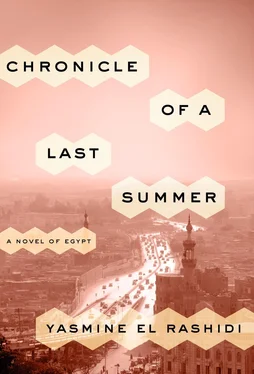Uncle and Mama argued that morning. He insisted the demolition proved the government had been behind an attack on a Coptic village that had gone uninvestigated by the state. Mama was adamant it couldn’t be. Her best friend Farida was a Copt and said the government was the only thing protecting them. Mubarak and the Pope were one. It was politics, pure and simple. Uncle turned to me and asked what I thought. All through the summer he had been saying we were on the brink. He told me I had to learn to feel the air change. It was all in the sounds, the way particles moved, echoed. The sounds of the city had shifted. We had sat on the balcony on consecutive Sundays over the entire summer and listened. He pointed to the reverberations of car horns. How the honking had both quieted and intensified, taken on a different impatience. We listened to the voices that echoed in from the streets and across the river. The constant chatter had given way to more abrupt bursts of expression. Something was pacified, followed by discharge. We could make out none of it, but the very tenor had shifted. We also listened for when the sound of the city suddenly stopped. A/Cs and the drone of business and machines and generators would roar and then collapse. For a moment there would be quiet, then the cars and the honking and a rumble would begin. It was a sign of excess, a city over capacity. We were breaking down. It was like a building, Uncle said. Filled beyond measurable proportions, badly wired, with extensions, borrowed power, borrowed pipes. He would look at me and shake his head, say nothing, but I knew what he was thinking. He had said it many times before over the years. This was what my generation was inheriting. It was up to us to mitigate the losses, the mistakes. Uncle tried to hold on to as many of the better memories as he could, many with Granny and Mama on this same balcony, eating mangoes, watermelon, white cheese, watching the Nile and looking out onto the expanse of green fields. It reached the horizon, and seemed to extend further, into the unknown. All we could see now beyond the sliver of Nile and the bushes of the garden were miles of a sepia city, and past that, in a horizon marked by a chalk line of rust red, the informal settlements. They made me think back to when Baba used to take me with him to the factory when I was a child. Back then the roads in the center of town were paved, but once you got to the outskirts of the city, much of it was dirt track. You knew you had come to the city’s end, it was like reaching the edge of the earth, where one line and color and atmosphere ended, and a plunge into something less certain began. Baba would slow as he maneuvered the car down from the tarmac onto the rougher, pebbled tracks. The sprawling tapestry of sepia and unfinished redbrick blocks that now extends for miles was then just desert, or crop. The colors around us changed. As I looked out from the balcony, I remembered all this. Rows and rows of redbrick and concrete buildings, unfinished, not connected in any way to the infrastructure of the built city. It was there, Dido had said, that the fight would erupt. He urged me to read Vertigo . Set in 2030, it was prophetic. Dido spoke of the fight as if he wanted a war, but he was a romantic, and I knew that in his heart what he really wanted was for comrades, dissidents, to unite: raise a flag, occupy the streets, talk about love, peace, revolution. I couldn’t imagine it, but I listened, read Ginsberg and Darwish to him aloud, asked him to describe what came after this utopia he envisioned. What would he do next?
That summer, sitting on the terrace with Uncle, I asked him what he thought. Is it possible? Could it happen? What would it mean? Uncle said it was inevitable, eventually some change would come, but much more so he wished our lives were different. To fall in love, to build a life with a loved one, was the greatest freedom. He hoped I, we, would have that one day. He understood that none of it was so straightforward. Most young people can’t afford to build independent lives. Love is a calculation, of resources and pedigree. Uncle never spoke about his own love, but I knew of her. They met in college, but she had been married by arrangement to a family friend in their sophomore year. Uncle promised he would wait for her until the day she divorced. They wrote letters to each other, mailed from across the city, looking out at the same horizon, the same skyline. They would meet when they could, at the supermarket, the club, on the corner of the street before she picked up her children from school. Dido had told me that Uncle would wait for her forever. Her husband would never leave her. It was a matter of pride. It was one of the things Dido had encouraged me to fight for, that we had to fight for, the right to divorce as women. Uncle died waiting. He died before her. We had never spoken about his own emotions, but he was the only one who talked to me about desires. I had found the courage to ask him about our cousin in America that summer. What happened? Why had he left? Why would no one talk about it? Why did Mama’s neck tense whenever his name came up? What were the problems ? Why couldn’t he come back? Uncle had looked me straight in the eye and said that I must have known. I have a sense. He paused. Muttered something about the terror of the state and personal choices and freedoms, then paused again. You know how it is, he said. I couldn’t understand if they didn’t see it in others or it was something they just chose to ignore. I turned my eyes down to the newspaper and asked him if he was hungry.
—
Mama appeared through the mashrabiyya doors in her robe. She had heard us talking. Did she want a coffee? She shook her head as she tied a second bow on her satin sash. Her robe was a pale pistachio. She had stopped wearing the one Baba had given her the autumn before. I had sat in her bedroom as she went through closets, bringing out winter clothes, packing away summer ones. On the armchair in her room she made a pile of things to give away. It was the first time I had seen Mama give away anything. I lay on her bed, elbow propped, head on my hand, her back towards me as she rummaged. I could see my reflection in her mirrored closet doors, and as well her face. That was the day she told me about the dream. The house had been painted white, there was a white wooden fence around it, the garden was in full bloom. She saw Granny. Flowers sprouted everywhere. Flowers that had never grown before. Tulips. Colors we’d never seen. The grass shimmered emerald. It was pouring with rain. A cherry-covered cake was placed on the lawn. The rain fell around it. The dream was a good one. The white was an indication of new beginnings, and the rain a good omen. I asked why Granny was there, what she thought it meant. Mama raised her eyebrows as if to say who knows, then said that only God knew.
I got up and went through her pile of clothes to give away. I wanted to ask if she was sure about the robe, and what about the white silk blouse, and this belt, really? They were all things Baba had bought. I swallowed the thought as I felt it rise and roll onto my tongue. I had cleared out downstairs myself two summers earlier with a tepid urgency, getting rid of what I could from the past. Mama had come down as I was putting things in bags, going through drawers, marking piles for storage or to be thrown away. I had felt her in the main room before I saw her, the tension emanating from her body. I could tell she was uncomfortable. Downstairs had been closed for years. Nobody spoke about it anymore. It was as if the floor, its entire lifetime, had been banished or erased. Then Granny and Nesma visited me in my dreams, calling me downstairs. I saw them in the dream, standing on the stairs, repeating my name, telling me to join them. I wondered if it was about death. They say you know in the days before you die that they’re your final ones, signs come to you. Or was it just a dream about space, my own consciousness of it? When I told Mama, she had been sitting at her dressing table combing her hair. I could see her inhale deeply, her chest rising, her neck pushing back against her head, but she didn’t say a word. Her pause was so long, it felt like disapproval, and I got up after a while and left. Then the dream came again. That August, finally, Mama told me I could do as I pleased. She said it without words, just with her eyes and a nudge of her head. Ours wasn’t a culture used to change. Permanency was valued. We lived in the same places we were born in. We married and moved around the corner. A job was held for decades. The less change, the less movement, the better. It was a view to stability, rather than the oppression I had internalized it to be. Everyone we knew preserved lives as they were, over generations. Sofas stayed covered in plastic, glass cabinets with proliferating displays were not to be touched, every gift, every token, every ticket, stuffed somewhere, or in a drawer. Most people’s homes were like time capsules, offering panoramic views of every year until the present one. The narrative of Granny’s floor had begun in 1940 and ended three days after she died, in 1983. The piles of hoarded newspapers and magazines spanned those years. The gadgets, gifts, flyers, phone books, postcards. Her letters were stored in shoe boxes and tied with ribbon. The last one dated December 31, 1981. It was postmarked Lalibela. Inside was a string of brass beads. It was signed, Devotedly yours. The letter before that was locally stamped, from the brother of Sadat, offering greetings for the Eid. A few days before came a government notice about tax. Mama had asked me to keep certain things, even though she knew we might never look at them again and until that moment we had no sense they had even existed. I put what I could in boxes, covered the furniture in sheets, bubble-wrapped paintings, glasswear, porcelain, china, and silver. Boxes and boxes of letters, postcards, photographs, film reels, negatives, crochet thread, stamps, brooches. Suitcases of clothes, Granny’s, folded and put away. Everything was moved to the basement. I kept a single photograph from Granny’s collection, framed it, and had it hung on a wall by the entrance. It is of downstairs, one day when Granny was still alive. It looks like it might be winter, judging from the dress, although the house is always cold. Granny is sitting in a corner, Nesma by her feet, both of them drowned out by the deep cocoa tones of the furniture and curtains and paintings and the great grandfather clock looming nearby. A blanket covers Granny’s lap. A furry shawl is flung over Nesma’s shoulders. A seven-layered chandelier cuts across one side of the frame. Granny’s lips are a deep pink, jumping out amid somber tones. I kept that, and as well a series of Granny’s paintings, miniature, Polaroid-size oils of the view from the main terrace, painted on November 28 of each year since the house was built. They hung on the largest wall in the sitting room, off-center, to the right. The palette changed very slightly on each canvas, from greens and earth tones to scales, eventually, of sepia, rust, and grays. Four of the years were missing. Mama didn’t know why. The gaps of those years were left as spaces on the wall that themselves had become tinted with time. It was the single wall I didn’t paint white. Once I moved downstairs Mama would come down often and look at the paintings. She would sit with her coffee cup on the rocking chair facing them and tell me that it was like watching a film. The stories would come flooding back, filling her, occupying her mind’s eye.
Читать дальше

![Маргарет Миллар - Rose's Last Summer [= The Lively Corpse]](/books/384369/margaret-millar-rose-s-last-summer-the-lively-c-thumb.webp)










